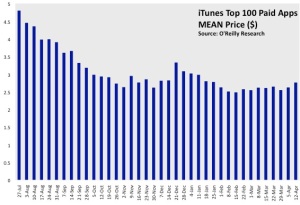The FDA outlines draft guidance on AI for medical devices
The agency also published draft guidance on the use of AI in drug development
Read more...
Last week I reported on the uber-creepy Secret SMS Replicator app created by DLP Mobile, which lets users monitor another person’s text messages without a visible icon or shortcut to give the game away. Mere hours later, the app was pulled from the Android market. Sorry, DLP. What’s noteworthy about this is the fact that DLP Mobile specifically developed the app for Android because the company knew it would not pass Apple’s approval process…which leads one to wonder if Google will now be employing a screening process to avoid these little Android gaffes. How does Google keep questionable apps from populating its market in the first place?
In the past, Google has called the Android market an “open distribution channel” and boasts that the app market has no pre-approval process for apps. Rather than initiate a formal screening process before the app is uploaded, Google simply relies on users to tell it when a questionable app has surfaced.
"Once an application has been uploaded by the developer and made available for users of Android-powered handsets, the Android Market community is relied on to flag applications that do not abide by our policies," Google told the FCC in August 2009.
If an app is repeatedly flagged, a team of Google staffers will review the app for policy compliance. If the app is found to be in violation of Google’s policies, it will be removed within three days (the Secret SMS Replicator app was removed within hours of appearing in a New York Times article).
As it turns out, more than a handful of apps have been pulled from the Android Market this way. In August 2009, Google informed the FCC that "Approximately 1% of all applications that have been uploaded to Android Market and subsequently made available to consumers subsequently have been taken down by Google." This was back when the Android Market only had 6,000 apps. The Android Market recently hit 100,000 apps, which means that some 1,000 apps have been pulled.
Policy violations generally include things like adult content or copyright infringement. Compare this to Apple’s approval process, which bans apps featuring obscene, pornographic, “offensive,” or defamatory content. Apps have been pulled for everything from containing overly sexual content to mocking public figures. One banned app, called the Obama Trampoline, allowed users to choose from among 18 politicians (including Hilary Clinton, Sarah Palin, and, of course, Obama) to bounce from a trampoline in the Oval office. By carefully controlling the tilt of the phone, the user could make the bouncing politicians pop balloons on the ceiling. The app was pulled for bordering on defamation.
Another banned app, called the Slasher, featured a photo of a butcher knife (no blood or graphic material) and would play the music from Psycho when the user mimicked a stabbing motion with the phone. The app was pulled and later re-approved.
While Google pulls about 1% of apps from its Android Market, Apple claims to reject 20% of apps. This all-or-nothing environment for app developers doesn’t help anyone. When a developer spends months working on an app, he/she doesn’t want to face a 1-in-5 chance of being rejected because the app could be construed by some as offensive or defamatory. That developer may be more inclined to simply upload the app to Android and wait and see if anyone has a problem with it. Conversely, that could also lead to potential problems, such as malware apps.
In December 2009, First Tech Credit Union released a warning about a rogue Android App called Droid09, which created a shell of mobile banking apps in an attempt to access users’ banking information. Before getting pulled, Droid09 had published almost 40 variants of its app, each one targeting a different bank.
It would be nice if a happy middle ground could be found somewhere. In the meantime, creepy apps like the Secret SMS Replicator will make their way through the Android Market while fun apps like the Obama Trampoline will never see the light of day in the iTunes App Store.
Update: DLP mobile is revamping the app to make it more ethically palatable. The app will now be available as the SMS Nanny for parents to monitor children's text messages, and a visible icon will let kids know that their texts are being watched.
A Google spokesperson stated via email: "Secret SMS Replicator was removed from Android Market for violating the Android Market Terms of Service. We don't comment on what specific rules it broke, though. And we do not have an approval process for apps like Apple's app store, but we do remove apps that are malicious or violate our Terms of Service."
Image source: Huffingtonpost.com
The agency also published draft guidance on the use of AI in drug development
Read more...The biggest focus areas for AI investing are healthcare and biotech
Read more...It will complete and submit forms, and integrate with state benefit systems
Read more...



